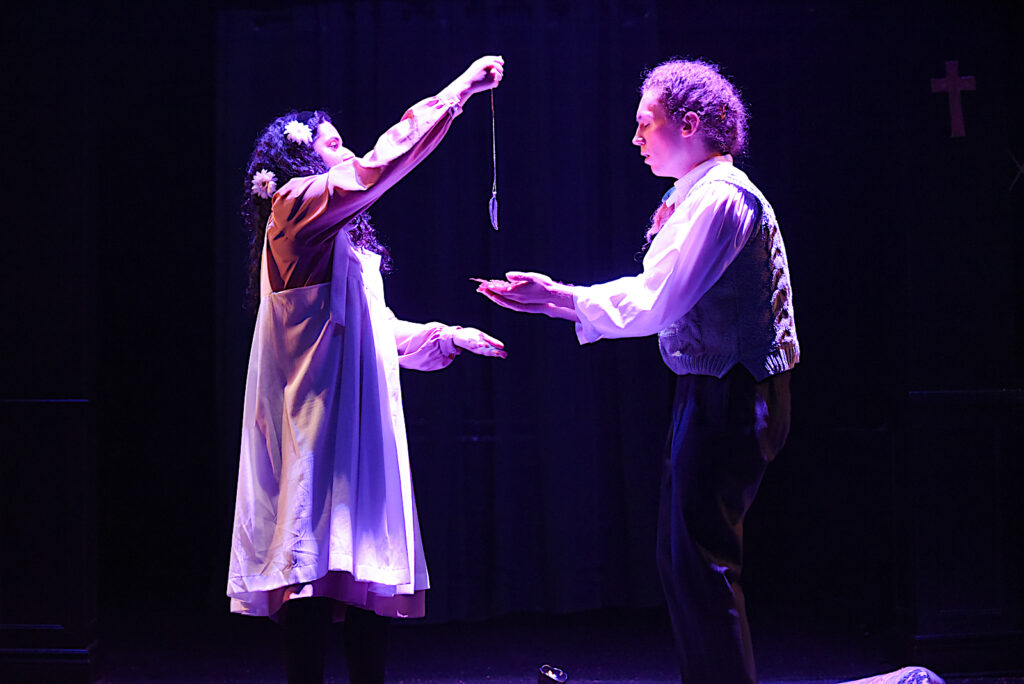I had felt it again and again — how my equilibrium depended on the success of my rigid will, the will to shut my eyes as tight as possible to the truth that what I had to deal with was, revoltingly, against nature. I could only get on at all by taking “nature” into my confidence and my account, by treating my monstrous ordeal as a push in a direction unusual, of course, and unpleasant, but demanding, after all, for a fair front, only another turn of the screw of ordinary human virtue.
The Turn of the Screw, Henry James
Conceived by James as a serialized novella in 1898, The Turn of the Screw, reset as an unnerving chamber opera composed by Benjamin Britten a half century later, probes deep into the dark corners of human conduct, a haunting and haunted parable of damaged psyches and twisted motivation. The psychotic and the paranormal, the socially prescribed and the subversive all hide beneath a unyielding veil of trauma and distress. Ambiguity weighs heavily in both tellings of story here although admittedly with differing degrees of density depending on authorship.
In the original unexpurgated James version, a newly engaged governess — the nameless narrator of the tale — charged by her wealthy ne’er-do-well employer to care for his two orphaned young wards closeted away in a crumbling old country house, encounters what she concludes are a pair of ghosts. Seven separate sightings of the eerie pair, disreputable former servants Peter Quint and Miss Jessel, she determines, lead the governess to believe that the children, Flora and Miles, have been possessed despite the deliberate absence of concrete evidence on James’ part to support his frantic heroine’s increasingly frenzied claim. Or, in fact, that the ghosts exist at all given that no one, other than herself — not the children, not even the ever-present housekeeper, Mrs. Grose — ever apparently sees them. That the governess is suffering from schizophrenia or, at the very least, actively hallucinating is a profound, subtly plotted possibility.
Summoning a no less vivid adjunct reality, Toronto’s indefatigable indie innovator, Opera 5, pins James’ harrowing saga onto a broader canvas with a highly literate, startlingly illuminating rendering of Benjamin Britten’s harrowing portrait of fear and the unknown.
In James’ narrative, the impact of the ghosts within the reader’s purely intellectual frame of reference is necessarily a function of imagination — ineffable, terrifying, limitless. Horror of the mind. In Britten’s opera, libretto by frequent trusted collaborator Myfanwy Piper, we, the audience, experience the apparitions as tangible on-stage characters, physically defined, acutely audible, expressly individualized, greatly reducing the level of pre-existing Jamesian ambiguity. In director Amanda Smith’s mind, as in Piper and Britten’s, the ghosts of Peter Quint and Miss Jessel are quite clearly disturbingly present despite the continuing inscrutability of their otherworldly intentions.
What is clear in this sweepingly intelligent, eloquent, Turn of the Screw, however, is the impact of social paranoia on widely perceived aberrant practices and systems of non-traditional belief. Folk magic is everywhere on show.
A line from from The Second Coming by W.B. Yeats woven into Piper’s symbolist-inspired libretto, Britten’s churning score further articulating the message, speaks with urgent voice before ultimately lapsing into silence.
The ceremony of innocence is drowned.
The Cunning Folk are at work, a fleeting surtitle informs, with their leaves and feathers and scattering of soil. Mystical totems. The children, practitioners. Healing rituals learned from Quint and Jessel, no doubt. Abandoned by their guardian. Isolated. Friendless. Chalk circles drawn by Miles. Wild swan wings worn by Flora. Solace and secrets hidden under a carpet. Never entirely swept away though the local parish Priest may try.
The textual structure of The Turn of the Screw is relatively straightforward, a linear succession of sixteen discrete vignettes, occasionally leaping forward in short, clipped bursts of time, backstory bluntly explicated in the form of a decidedly anxious solo piano-based Prologue. Characters remain fundamentally fixed throughout with the exception of Miles who essentially reveals more and more of his inner demons while continuing to tell us less and less.
Britten’s tirelessly atmospheric score sets the pace, a fluid succession of sprawling multi-faceted ariosos and recitatives informed by a vast variety of vocal forms — nursery rhymes, English folksongs, songs from schoolbooks, original songs composed by Piper and Britten themselves, a sacred canticle rewritten in a vaguely mocking, approaching blasphemous style. Short, instrumental interludes — Variations in Britten’s self-identified nomenclature — punctuate the proceedings, announcing each new scene in wave after wave of stunning inventiveness, infinitely engaging, brilliantly orchestrated.
Returning to Theatre Passe Muraille after a long 6-year company hiatus, Opera 5 resident music director Evan Mitchell leads an exceptionally flexible 13-player ensemble, a potent source of endless thrills, featuring particularly fine contributions from Trevor Chartrand playing obligato celesta. Britten’s ubiquitous Quint motifs have surely never sounded more spine-tingling. Percussionist Tim Francom’s towering Act II evocation of church bells adds a resounding ringing note to The Turn of the Screw’s excruciatingly anachronistic call to empty Christian worship.
Singing the role of Peter Quint, tenor Asitha Tennekoon gifts us with a chilling rendition of evil personified, supremely unphased by Britten’s wicked stratospheric tessitura. Rachel Krehm is deeply affecting as an anguished Miss Jessel. Appearing as the Governess, soprano Elizabeth Polese quite simply soars in a hugely demanding performance balanced on the cutting edge of harmony. Mezzo-soprano Krisztina Szabó is an eternally resonant Mrs. Grose. Countertenor Ryan McDonald and soprano Thera Barclay simultaneously charm and terrify as Miles and Flora respectively.
An astonishingly insightful Turn of the Screw, altogether original, eloquent and poetic. Dramaturgy unbounded. A remarkable unearthing of suppressed Victorian folkways, obscured by time, moodily spotlit and made explicable, lends an air of lasting humanity to Britten’s shimmering, evanescent masterpiece.
Opera 5 utterly triumphs.


